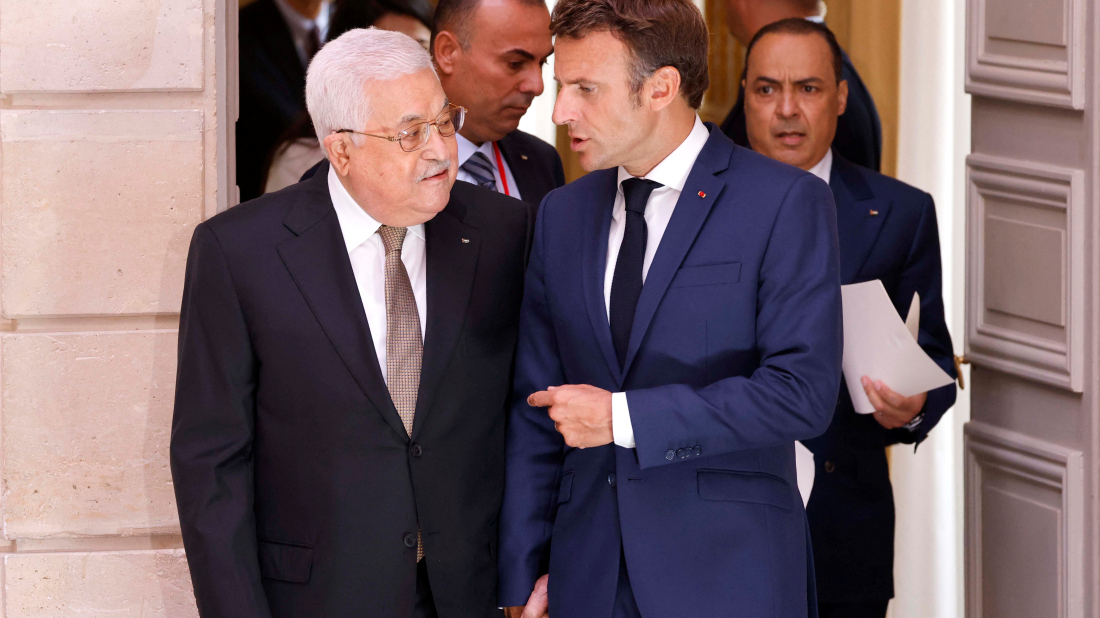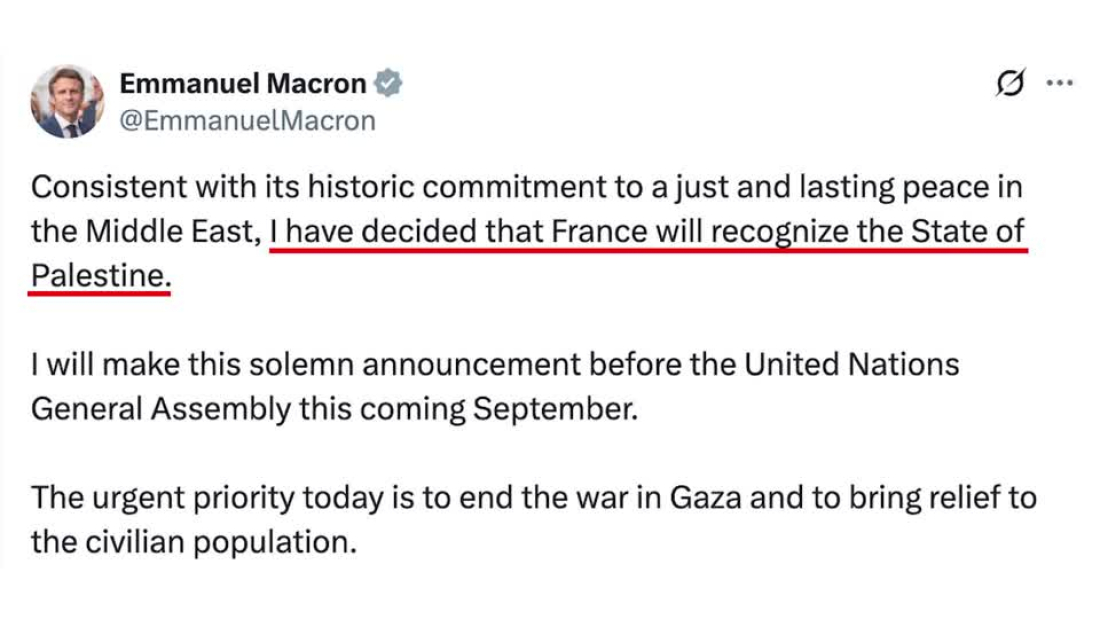Powerful winter storm batters U.S. Northeast, New York City imposes travel ban
A powerful winter storm has struck the north-east United States, placing nearly 60 million people under weather warnings. States of emergency have bee...

French President Emmanuel Macron has announced that France will officially recognise Palestinian state, making it the first G7 nation and permanent United Nations Security Council member to take such a step.
The move has triggered strong condemnation from Israel and the United States, but could set a precedent for others, including Britain and Canada, to follow.
Macron confirmed the decision in a letter sent to Palestinian Authority President Mahmoud Abbas on 24 July.
In it, he pledged France’s intention to move ahead with recognition and to encourage other countries to do the same.
A formal announcement is expected at the United Nations General Assembly in September.
France becomes the first major Western country to shift its diplomatic stance, following the formal recognitions by Spain, Ireland, and Norway in 2024.

The recognition of Palestinian statehood remains mostly symbolic.
Israel still occupies the territories—Gaza, the West Bank, and East Jerusalem—that Palestinians claim for their future state.
But France’s move could add diplomatic weight to push for Palestinian sovereignty, especially given its influential role in global politics and its large Jewish and Muslim populations.
"I think the importance is that a) France is a permanent member of the (United Nations) Security Council, it still makes a difference. It's the first G7 country to recognise Palestinian statehood. And if the UK joined, it would be two of them - Security Council and permanent members...G7 members. And indeed, it (France) is also sending a letter to the president of the Palestinians, Mahmoud Abbas. And then we have to see. We see already the reaction in Israel, we saw the reaction in the United States, which was, again, only to be expected, very negative," said Yossi Mekelberg, Senior Fellow at Chatham House, a recognised expert in the Middle East and North Africa policy.
The announcement comes amid growing international criticism over the humanitarian crisis in Gaza.
The World Health Organization (WHO) recently described the hunger crisis there as "man-made mass starvation."
Israel says it allows aid into Gaza but must control its distribution to prevent diversion.
Macron has been signalling support for recognition for months as part of efforts to revive the two-state solution, a longstanding but stalled international framework for peace.
He moved forward with the announcement last week, ahead of a UN conference co-hosted by France and Saudi Arabia (28 July - 30 July), likely to increase pressure on other hesitant or undecided nations.
"We are at a point in the history of the Israeli-Palestinian conflict where there is recognition, after two years of a bloody war, of all the horrific pictures we see from Gaza, what happened on October 7th (2023). And we see the kind of leadership that they don't move to a two state solution, that the international community should try and break this impasse. This then has to pass. It doesn't come without a price, and a heavy price. And as a result, you know, you look at the range of options to try and break the stalemate, and this is one of the major ones," said Mekelberg.
Israel has warned France for months not to proceed with recognition, with some officials reportedly describing it as “a nuclear bomb” for bilateral relations.
Israeli threats ranged from reducing intelligence cooperation to undermining France’s regional diplomacy and even hinted at annexing parts of the West Bank.
France’s move could influence countries such as Britain, Germany, Australia, Canada, and Japan. Within the European Union, Belgium and Malta are considered the most likely to follow next.
"I don't think as such what Macron says would put immense pressure (on others to follow suit), but it might actually create a momentum. And momentum for others...those who... you know, the first one is usually the most courageous one. The others can actually hide behind them... and go 'we are not the ones who set the precedent', there is already a precedent for the G7. So one can hope that this creates this kind of momentum - Germany won't be because of history. It's not going to be followed suit very, very soon. I think our eyes should be on the UK and possibly Canada," Mekelberg said.
In the UK, opposition leader Keir Starmer has voiced support.
"The Palestinian people need to know there is a genuine will and determination from Israel, from Arab states, from the West, to finally address their plight in deeds as well as words. Because the Palestinian claim to statehood is not in the gift of a neighbour. It is an inalienable right of the Palestinian people and the clear logic of any call for a two-state solution. So my Labour Party will fight for that cause. We will work with international partners towards the recognition of a Palestinian state as part of a negotiated, just and lasting peace."
Mekelberg also added that UK’s government tends to be very cautious and unlikely to act hastily, but there is a possibility that Prime Minister Starmer could decide to follow France’s lead by September, given that the situation in Gaza is increasingly untenable; rather than external pressure, he said, it may be a new political dynamic and momentum that drives such a decision.
More than 140 of the 193 United Nations member states already recognise Palestinian statehood, including most of the developing nations in Africa, Asia, and Latin America, as well as Russia, China, and India.
In Europe, only a few EU members— such as Sweden, Cyprus, Spain, Ireland, and Norway—have recognised it.
The United Nations General Assembly granted Palestine "non-member observer state" status in 2012.
Azerbaijan is among the countries that formally recognise the State of Palestine.
According to the Ministry of Foreign Affairs of Azerbaijan, diplomatic relations were established on 15 April, 1992, and the two nations have since maintained close political ties.
Azerbaijan has provided millions of dollars in humanitarian and financial aid to the Palestinian people, and the two countries regularly support one another on international platforms.
High-level visits between heads of state and foreign ministers have taken place over the past decade, reinforcing bilateral cooperation, particularly in the humanitarian and economic spheres.
How did the U.S., Israel, and Palestine react?
Israel reacted harshly.
Prime Minister Benjamin Netanyahu said the move "rewards terror and risks creating another Iranian proxy."
Defence Minister Israel Katz called it "a disgrace and a surrender to terrorism" and warned Israel would never allow the establishment of a "Palestinian entity that would harm our security, endanger our existence."
U.S. Secretary of State Marco Rubio echoed those sentiments. "This reckless decision only serves Hamas propaganda and sets back peace," Rubio posted on X.
"It is a slap in the face to the victims of October 7th." he added.
The Palestinian Authority welcomed the move.
Palestinian Vice President Hussein Al Sheikh said that Macron’s decision reflected “France’s commitment to international law and its support for the Palestinian people's rights to self determination and the establishment of our independent state."
"It's very much welcomed by by the Palestinians. It's something that they were advocating - not for months, not for years, for decades - 'Recognise us as a state'. You know, many people forget the Oslo Accord, that is nearly 32 years old, should have been concluded within five years in exactly that, in a two state solution. In a two state, Israel and Palestine coexist peacefully, one next to the other. Now, obviously, both sides will always love to embark on a blame game, on who's to blame more for this never happening," Mekelberg said.
Can this lead to full UN membership?
Unlikely in the near term.
Full United Nations membership requires approval from the UN Security Council, where the United States has veto power.
"The international mechanism of recognising a state goes through the Security Council. Unless we override the system, then this is where we stand. And the United States, at least from what we see with the response to France, is not going to change its mind in a hurry," Mekelberg said.
A seven-month-old Japanese macaque has drawn international attention after forming an unusual bond with a stuffed orangutan toy after being rejected by its mother.
Divers have recovered the bodies of seven Chinese tourists and a Russian driver after their minibus broke through the ice of on Lake Baikal in Russia, authorities said.
UK politicians have renewed calls for Andrew Mountbatten-Windsor, formerly Prince Andrew, to be removed from the line of succession following his arrest on suspicion of misconduct in public office and revelations over his links to convicted U.S. sex offender Jeffrey Epstein.
President Donald Trump said on Saturday (21 February) that he will raise temporary tariffs on nearly all U.S. imports from 10% to 15%, the maximum allowed under the law, after the Supreme Court struck down his previous tariff program.
Pakistan said it carried out cross-border strikes on militant targets inside Afghanistan after blaming a series of recent suicide bombings, including attacks during the holy month of Ramadan, on fighters it said were operating from Afghan territory.
Hungary has said it will block the European Union’s latest sanctions package against Russia unless oil supplies through the Druzhba pipeline are restored, deepening a dispute with Brussels and Kyiv over energy security.
The 2026 Winter Olympic Games came to an end with a closing ceremony inside the historic Arena di Verona, marking the conclusion of more than two weeks of competition across northern Italy.
The United Kingdom Defence Secretary John Healey has said he hopes to be the minister who oversees the deployment of British troops to Ukraine, arguing that such a move would signal the end of Russia’s war.
The United States and Iran will hold a new round of nuclear negotiations in Geneva on Thursday as part of renewed diplomatic efforts to reach a potential agreement, Oman’s Foreign Minister Badr Albusaidi announced on Sunday.
Mexican authorities said on Sunday that Nemesio Oseguera Cervantes, known as El Mencho and head of the Jalisco New Generation Cartel (CJNG), was killed during a military operation in the western state of Jalisco.
You can download the AnewZ application from Play Store and the App Store.

What is your opinion on this topic?
Leave the first comment